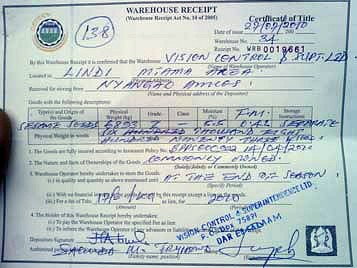
Like many farmers, those in the Nyangao Agricultural Marketing Cooperative Society (AMCOS) in the Lindi region of Tanzania lacked the collateral needed to access credit from banks. Unlike other sectors, farmers have a short window of opportunity to profit from their yields every season. In addition, farmers are forced to sell immediately at harvest -when prices are low - to prevent perishable crops from spoiling.
The Government of Tanzania recognized that when farmers have reliable storage facilities, they gain the flexibility to store their crops until they find buyers at fair market prices. A new Warehouse Receipts Law allows farmers to use the receipts from food storage warehouses as collateral to access credit. Thus, farmers gain bargaining power rather than selling at any traders’ discretion. Many local banks, however, are unfamiliar with Warehouse Receipts and are hesitant to accept them as a new form of collateral.
Looking to solve this problem while increasing donor efficiencies, USAID and the African Development Bank jointly signed a $20,000,000 partial loan guarantee with CRDB Bank to encourage pre- and post-harvest lending, as well as investment capital in Tanzania’s agriculture sector. After two years into the ten year partnership, more than $5 million in credit has been approved for agribusinesses. For the farmers who have come together to form Agricultural Cooperative Societies in the Lindi region of Tanzania, the impact of the credit has been life changing. These farmers, who are seeing profits for the first time in years, are using them to pay fees to keep their children in school, upgrade their living conditions, and invest in additional equipment to improve productivity.
Training and an in-house technical assistance program for the AMCOS farmers is critical to the success of this guarantee. The leaders of the cooperative learned about the benefits of the warehouse receipts system, record-keeping, and cash flow management. They are not the only group to learn something new through this guarantee. CRDB Bank has learned that Warehouse Receipts are a safe and valuable form of collateral and is now willing to lend against warehouse receipts without the guarantee. As other banks observe the profitability of the agriculture sector and gain confidence in Warehouse Receipts, the entire nation of Tanzania stands to gain from increased food production.







Comment
Make a general inquiry or suggest an improvement.